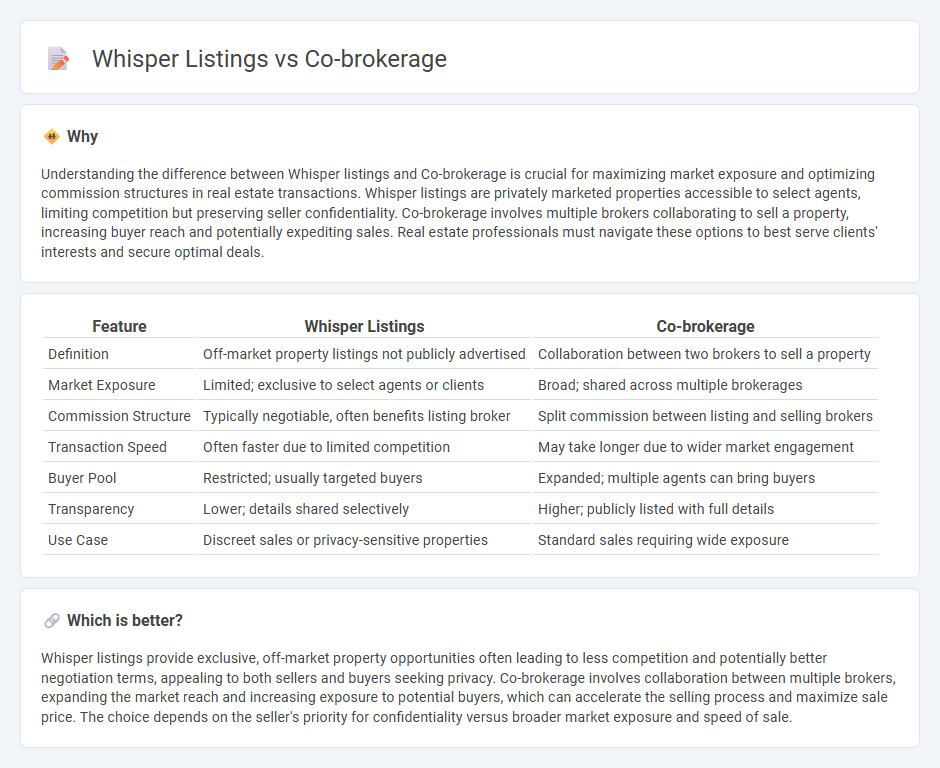
Whisper listings involve exclusive properties shared discreetly with select agents to maintain privacy and control over the sale, often resulting in reduced market exposure but potentially higher confidentiality for sellers. Co-brokerage agreements allow multiple agents or agencies to collaborate on a property transaction, expanding marketing reach and increasing the likelihood of a quick sale by leveraging combined networks. Explore the differences between Whisper listings and Co-brokerage to determine the best strategy for your real estate needs.
Why it is important
Understanding the difference between Whisper listings and Co-brokerage is crucial for maximizing market exposure and optimizing commission structures in real estate transactions. Whisper listings are privately marketed properties accessible to select agents, limiting competition but preserving seller confidentiality. Co-brokerage involves multiple brokers collaborating to sell a property, increasing buyer reach and potentially expediting sales. Real estate professionals must navigate these options to best serve clients' interests and secure optimal deals.
Comparison Table
| Feature | Whisper Listings | Co-brokerage |
|---|---|---|
| Definition | Off-market property listings not publicly advertised | Collaboration between two brokers to sell a property |
| Market Exposure | Limited; exclusive to select agents or clients | Broad; shared across multiple brokerages |
| Commission Structure | Typically negotiable, often benefits listing broker | Split commission between listing and selling brokers |
| Transaction Speed | Often faster due to limited competition | May take longer due to wider market engagement |
| Buyer Pool | Restricted; usually targeted buyers | Expanded; multiple agents can bring buyers |
| Transparency | Lower; details shared selectively | Higher; publicly listed with full details |
| Use Case | Discreet sales or privacy-sensitive properties | Standard sales requiring wide exposure |
Which is better?
Whisper listings provide exclusive, off-market property opportunities often leading to less competition and potentially better negotiation terms, appealing to both sellers and buyers seeking privacy. Co-brokerage involves collaboration between multiple brokers, expanding the market reach and increasing exposure to potential buyers, which can accelerate the selling process and maximize sale price. The choice depends on the seller's priority for confidentiality versus broader market exposure and speed of sale.
Connection
Whisper listings in real estate refer to unadvertised or off-market properties shared discreetly among select agents, enhancing privacy and exclusivity. Co-brokerage involves collaboration between multiple brokers to market and sell a property, often increasing the property's exposure and potential buyer pool. Whisper listings frequently serve as opportunities within co-brokerage agreements, enabling brokers to access exclusive inventory and negotiate better deals for clients.
Key Terms
Commission Split
Co-brokerage agreements typically involve a transparent commission split, often ranging between 50% to 70% for the listing agent, ensuring both buyer's and seller's agents are compensated fairly. Whisper listings, by contrast, often bypass traditional co-brokerage arrangements to control access and may offer varied or exclusive commission structures to incentivize specific broker participation. Explore detailed comparisons of commission splits and strategies to optimize real estate deals effectively.
Off-market
Co-brokerage involves collaboration between multiple real estate agents to sell a property, often increasing market reach and exposure. Whisper listings are properties sold off-market through discreet channels without public listing, targeting select buyers to maintain confidentiality. Explore the key differences and strategic advantages of off-market sales methods here.
Dual Agency
Co-brokerage involves two separate agents representing the buyer and seller, promoting transparent and competitive transactions, whereas whisper listings often bypass broader market exposure to maintain seller confidentiality. Dual agency occurs when a single agent or brokerage represents both parties, potentially creating conflicts of interest due to divided loyalties. Explore the nuances of dual agency to understand its impact on the co-brokerage and whisper listing processes.
Source and External Links
Residential Co-Brokerage Industry Best Practices - Co-Brokerage refers to the cooperation of two or more brokers, typically a listing broker and a selling broker, who work together to complete a single transaction and share the commission according to local MLS policies.
Co-Brokering vs Double Brokering in Freight - Revolution Trucking - In freight logistics, co-brokering is a transparent, collaborative process where multiple brokers share responsibility for transporting a shipment with the knowledge and consent of all parties, distinguishing it from illegal double brokering.
Co-Brokering vs. Double Brokering - Carrier411 - Co-brokering allows brokers to combine their niche services and capabilities to better serve customers, expanding their service range and profit potential while maintaining transparency and cooperation.
 dowidth.com
dowidth.com